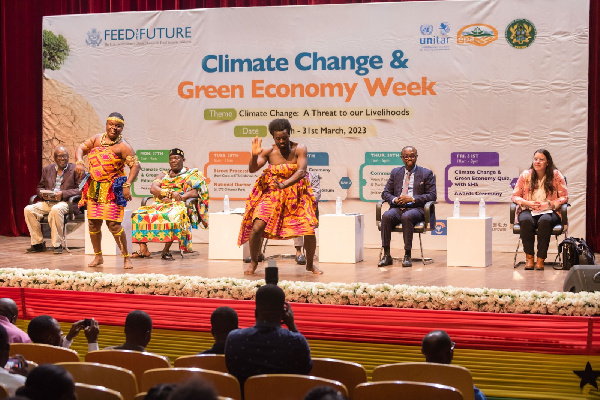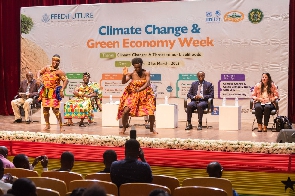The Climate Change and Green Economy week, which was officially launched in Accra recently by the Environmental Protection Agency, and the Ministry of Environment, brought together students and partners within the climate change space.
Ghana’s Minister of Environment, Science, Technology and Innovation, Dr. Kwaku Afriyie, in his opening address stated that rainfall patterns have changed as a result of climate change and Africa as a whole has to agree to stop burning fossil fuels and focus on green fuel.
According to Dr. Kwaku Afriyie climate change is real and the leadership of Ghana owe it a duty to develop and leave the world a better place for the future generations as the continent has been suffering from the warming temperatures, which have disrupted rainfall patterns, dried up water resources and impacted agriculture negatively.
The week-long celebration was to sensitize the general public about climate change through various activities, such as keynote speeches from high-level officials, an award, educational initiatives, youth dialogues and others.
The Climate Change and Green Economy Week since its inception in 2016 has been part of the country’s Learning Strategy to raise awareness about the role public education can have in increasing understanding of the challenges posed by the climate crisis and creating broad, community-driven action to try to stem its effects in the long-term.

EU LEAN project is being implemented by a consortium of four partners including the Rainforest Alliance (RA), Tropenbos Ghana (TBG), EcoCare Ghana, and World Vision Ghana, and working closely with the EU Delegation, private sector, and local communities.
LEAN project funded by the European Union, together with others have sponsored this year’s Climate Change and Green Economy Week under the theme ‘climate change: A threat to our livelihood’.
LEAN which stands for ‘Landscapes and Environmental Agility across the Nation’ is a four year project which aims to directly support national efforts to conserve biodiversity, improve the livelihoods of small-scale farmers, build climate resilience, and reduce emissions from land-use changes across Ghana’s savannah, high forest, and transition zones.


General News of Monday, 3 April 2023
Source: Edem Srem, Contributor

















